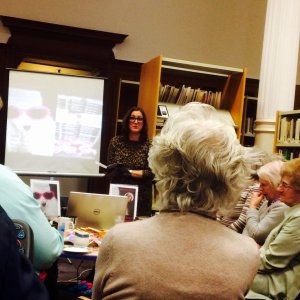This week I had the pleasure of attending a wonderful session at Glasgow Women’s Library Story Café. Fellow Thunderpoint author Helen MacKinven was speaking about her fantastic novel Talk of the Toun. Actually, she wasn’t just talking about the novel, she spoke passionately about her journey as a writer; her route to publication, and her determination to stay true to herself throughout. It was a fantastic presentation, an hilarious and honest map of Helen’s life in the 80s, and how she discovered her “voice” as a writer.
Like myself, Helen believes strongly in creating an authenticity for her characters through “voice”. By voice I mean a belief that an accent, or regional dialect, is an essential component in shaping not just the narrative arc but the authenticity of the characters in the story. Helen is from Falkirk and her characters’ dialect is strong and raw and most importantly real.

In my own novel The Birds That Never Flew I know that my characters would be flawed and one dimensional if they weren’t true to who they are in their inner “voice”. Essentially, their background and upbringing, how they think, talk and feel through their expression and speech are integral to who they are. Writers like Helen and myself don’t just use this language for effect (in my novel the dialogue can be strong, but it is always representative of the situation) we embrace it because it makes sense of who we are as writers. We believe in ourselves.
At the Story Café the use of dialect in Helen’s writing struck a chord and a very lively discussion followed her reading. In general, most were supportive of the use of dialect, although one member of the group did wonder if she was able to embrace it because of how lyrical and engaging it sounded as the spoken word and questioned if it would work so well for her had she just picked up the book. Overall though the sense was that your ear can tune to any rhythm if the narrative and characters grab you, and of course if the story is good enough. In my opinion, dialect adds to that, creating something strong and real and steeped in an authenticity that takes the story deeper, drives the drama to somewhere where it can shine from a position of truth.
Helen also discussed how her decision to commit to dialect had put some publishers off – even Scottish publishers – coming to the conclusion that text written in the vernacular doesn’t sell.
We all know this to be utter nonsense. The world is a better place thanks to the beautiful, real, words spoken by characters written by Kerry Hudson, Jenni Fagan, Anne Donovan, Irvine Welsh, James Kelman, to name but a few. The writer David Ross is in the club, and very proud to be so. He’s a guest on Helen’s blog this week and his post echoes our sentiment.
You have to feel who your characters are in order to write them as more than just words. They have to be of the words. Spoken or otherwise.
Having had the pleasure of meeting Helen it is no surprise that her talk was both insightful and fun. I’m a big fan of Talk of the Toun.
And I absolutely agree it’s so, so important that regional dialects are encouraged, nurtured and published… they not only add authenticity and make for rich stories, but it’s imperative we broaden the mainstream publishing RP voice to include the narrative voices from a far broader spectrum of both cultural & societal diversity.
LikeLike
Absolutely, I agree, but the mainstream publishers seem hesitant, certainly in Scotland. It’s almost as if we can’t see what we have in abundance because there’s a desire to look beyond it and grasp what others covet.
LikeLiked by 1 person
As I said on Facebook, I’m completely and utterly flattered that you felt my event was worthy of a blog post – thank you so much for coming along and your kind comments. And hear hear for being true to ourselves and our voice!
LikeLike
I had a great time at your event, honoured to be able to talk about it!
LikeLike